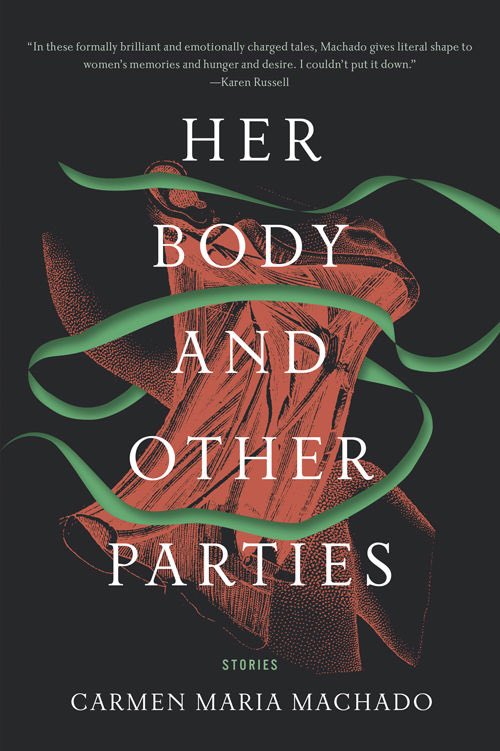tl;dr
Don’t waste your time reading this review. Just go buy the book!

Opening remarks
I’m not a squeee-er by nature (at least not publicly) but I’ve been excited about Her Body And Other Parties all year. I pre-ordered the collection in February… or was it March… anyway the moment it was available and have waited patiently ever since. While I’ve been twiddling my thumbs the collection has become one of the most anticipated books of the year, receiving exuberant praise from all the major critics and becoming a finalist for the National Book Award. I’m sure this is only the beginning, it’s also likely to feature in all manner of genre and literary awards next year.
But for all the love and adoration the most important question has not been answered. What do I think of Carmen Maria Machado’s debut short story collection?
A Knee-Jerk Comment on each short story
The Husband Stitch is a corker of a story to open the collection… maybe too good. Machado takes an old urban legend – the woman with a ribbon around her neck which she refuses to take off – and turns it into a dark yet playful look at urban legends and story-telling. Underpinning all this is a strong erotic flavour, linking the mystery of the ribbon to sexual desire and the taboo. A smart, luscious piece of writing.


Mothers is beautifully written but it didn’t come together for me as a story. It initially appears to be about a lesbian couple who have a child together (without the help of technology or a man) but also seems to be about something much deeper and more elemental and primal. I failed to put the thematic or metaphoric pieces together. Still, the writing in the last couple of pages burns hot.

The fourth piece in the collection starts off as a gag, a story inspired by Law & Order: SVU and structured around twelve seasons of the show and its 272 episode titles (now 432 episodes at the time of writing this review). The opening pages are very funny, taking the piss out of police procedurals, including serial killers, sex crimes and dead prostitutes. But then it gets weird with Benson seeing ghosts, Stabler struggling to communicate with his wife about something awful she experienced and the sudden appearance of doppelgängers for each of the heroes. And just as you think Machado can’t possibly sustain the humour and the weirdness this strange story of 272 episode titles becomes all dark and twisted. It’s astonishing that Machado pulls off what should have been a two-page gag into a tense, gripping narrative. Especially Heinous is my favourite story of the eight partly because it made me want to watch one of the million iterations of Law & Order (I’ve never seen an episode) and partly because I admire the chutzpah on display. And it’s laugh out loud funny.



Eight Bites is about a woman, ashamed at her size, especially after having a child, who has weight loss surgery in a bid to shed those pounds. The fat she loses conglomerates into an entity that lives in her house. In the hands of another writer, this would be an out and out horror story with the fat creature taking revenge. But Machado creates this forlorn character, shuffling around in the shadows, even helping out around the house. Like most of this book, it’s disquieting and strange and unlike anything I’ve read before.

The Resident is about an author who goes to a writer’s colony up in the mountains to spend time working on her next novel. These are the same mountains where she once camped out at as a girl scout. The story is a gothic mix of lanced boils, thunder-storms, the ripped open remains of a rabbit and some really pretentious artists. It’s possibly a tad too self-aware at times, I’m not fond of those moments when a character recognises that by their actions they’ve become a cliche (in this example the mad woman/lesbian in the attic) but it does have this awesome burn:

The final story in the collection, Difficult At Parties is a powerful piece about sexual abuse, trauma and the banal thoughts of porn stars. While Machado describes a number of gratuitous porn scenes, the actual assault the main character experiences is never depicted (the word “rape” is never thought or uttered). While the story is told from the victim’s perspective, Difficult At Parties is more about the inability of people (I include myself) to deal with those who have suffered dehumanising trauma. It’s an incredible story to end a collection, as good as the piece that started the book.
The gist of it
While this isn’t a suite of happy, chappy stories the joy of reading Her Body And Other Parties is the brilliance of the prose and Machado’s unwillingness to take the easy approach, to fall back on conventional structures and story-lines. Even when she’s mining familiar sources and ideas like well-worn fables, world-killing viruses and police procedurals she approaches the fiction from an unexpected direction.
This is also a collection that puts women, in particular, queer women, front and centre. It deals matter of factly about queer relationships but doesn’t hold back when considering and commenting on issues of body-shape, of desire, of sexual trauma. Each story deserves an essay and maybe, one day, someone will do precisely that, but for the moment this book is one of the best I’ve read this year and, if it was up to me, would win this year’s National Book Award.

Recent Comments